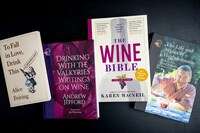This was the year of wine writer memoirs. Who knew we live such interesting lives?
The best wine books of 2022 get up close and personal

“The Life and Wines of Hugh Johnson”
By Hugh Johnson (Académie du Vin Library, 252 pages, $45)
The venerable British writer has helped ignite many a reader’s love of wine (including mine) with books such as “Vintage: The Story of Wine” and “The World Atlas of Wine,” now in its eighth edition (and co-authored by Jancis Robinson). “The Life and Wines of Hugh Johnson” is an updated revision of his 2005 work, “Wine: A Life Uncorked.” (Nice to have a mulligan in life.) It’s a memoir arranged more like a traditional wine primer or atlas. Rather than loading us with statistics of vineyard acreage and soil types, Johnson takes us along as he recounts his own journeys exploring the world of wine. He’s been all around that world, and he seems to have been present at or near the beginning of every fashion or trend, even if he disapproved of them.
This is a don’t-miss book for people who plan their travels around vineyards. Johnson is at his best when he unspools history from ancient times to the present, with wine as the constant, common thread. In a typical passage, he recounts a trip he took with fellow wine lovers retracing the routes of ancient Greeks to Lipari, a small island north of Sicily where Agamemnon sought obsidian, the “black shattered lava” that “made the keenest edge then known” for weapons. The island also made wine, of course.
“On Lipari, sitting in the balmy evening air under a vine, looking out at the wine-dark sea, I had no trouble dreaming myself back to the creak and smash of galleys, triremes with three banks of oars slicing the gray rollers south of Italy,” he writes. “This wine seemed right for the fighters of the Trojan wars: amber, nut-flavored, dense and strong.”
“To Fall in Love, Drink This”
By Alice Feiring (Scribner, 269 pages, $17)
While Johnson is a traditionalist, Alice Feiring is a firebrand. This country’s leading proponent of natural wine, Feiring burst onto the wine scene in 2008 with “The Battle for Wine and Love: Or How I Saved the World from Parkerization.” The book is a memoir as well as a battle cry against a not entirely imaginary world in which most wine conformed to the preferences of one all-powerful critic. “To Fall in Love, Drink This,” her latest, is more personal.
Feiring walks a fine line between vanity and vulnerability as wine becomes her portal to a life beyond the confines of her traditional New York City Jewish upbringing, where wine meant Manischewitz with the sabbath meal. For Feiring, wine is about connections — to nature, to the world, and most of all to other people: would-be lovers, even a chatty plumber who shares his own vulnerabilities while taking too long to fix her toilet. She once used her artist skills to draw kosher markings on the label of a wine she wanted her mother to try. And when her brother, with whom she had a lifelong emotional and spiritual bond, was dying of cancer, she poured him a Georgian wine “the color of rattlesnake venom,” not to revive him so much as to cling to him. “Drinking that wine was the closest I was going to get to sharing life with him, a last attempt,” she writes.
Along the way, Feiring introduces us to some of her favorite natural wine producers, including a husband-and-wife team she describes as “hospitable vegans.” These sections seem perfunctory and suggest that Feiring’s single-minded and often ideological focus on natural wine may have closed her off — or perhaps shielded her — from potential connections with a much broader world.
“Drinking with the Valkyries”
By Andrew Jefford (Académie du Vin Library, 224 pages, $35)
Andrew Jefford is of the British school, a generation younger than Johnson, having begun his wine writing career in 1988. “Drinking with the Valkyries” is a collection of Jefford’s columns, mostly for Decanter magazine. In such short doses he employs several moods, from the giddy delight of drinking young vintage port (the column that lends its title to the book) to somber reflection during the quiet of coronavirus pandemic lockdown in France, where he lives, when the arrival of nightingales on their spring migration from Africa reminded him that underneath the stillness, the world still moved.
“Wine has never seemed more superfluous as an edifice, a vast palace of fussiness; yet its essence, as not just a physical but a psychological or spiritual restorative, has never been more useful,” he writes. “Much and sometimes all of the customary texture of life has been stripped away, so we treasure that which fortifies resolve — like a glass of wine at day’s end. Wine, for the time being, has gone elemental.”
Jefford’s essays are like that glass of wine at day’s end — restorative, uplifting and enlightening. You may want to read another before putting down the bottle — I mean, the book.
“The Wine Bible”
By Karen MacNeil (Workman, 736 pages, $40 for paperback)
New wine lovers beginning to explore the horizons beyond the glass or anyone needing a one-stop reference book should look no further than the third edition of “The Wine Bible.” MacNeil has updated this third edition with color photos (finally) and new sections on ancient wine history and climate change. I enjoy opening the book at random. I’m always certain to see something new through MacNeil’s authoritative, whimsical and ever-joyful perspective.






